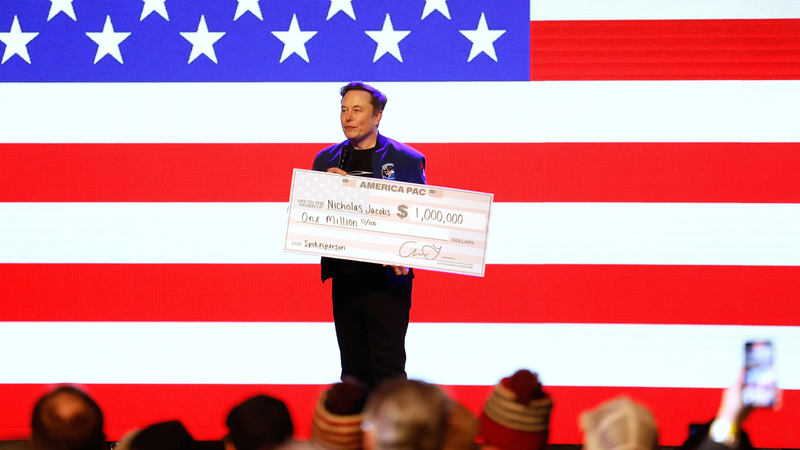Elon Musk made headlines Sunday night after handing out two $1 million checks during a town hall in Green Bay, Wisconsin—just hours after the state Supreme Court rejected a legal attempt to block the event. The giveaway, which Musk tied to supporting conservative state Supreme Court candidate Brad Schimel, reignited debate over money in politics, election integrity, and billionaire influence on American democracy.
Wisconsin Attorney General Josh Kaul filed a lawsuit to stop the event, accusing Musk and his political group, America PAC, of violating state election law by offering money to influence voters. Kaul argued that Musk’s offer was “a blatant attempt to violate” laws banning incentives for voting or supporting specific candidates.

However, the Wisconsin Supreme Court ruled against the motion just minutes before Musk took the stage. The court also rejected a request from Musk’s lawyers to disqualify two justices who had campaigned for liberal candidate Susan Crawford, Schimel’s opponent.
Musk, undeterred, addressed the crowd with urgency. “This isn’t just about Wisconsin,” he said. “This is about the future of the country—and maybe civilization.” Musk claimed the election could impact which party controls Congress in 2026 and stressed the importance of local elections in shaping national outcomes.
One $1 million recipient was Nicholas Jacobs, chair of the Wisconsin College Republicans. Musk’s team called the checks "spokesperson agreements" tied to America PAC, but critics remain skeptical, arguing the optics suggest a direct exchange of money for political participation.
Kaul’s failed actions highlight the legal difficulty in countering high-profile political spending. Musk’s aligned groups—America PAC and Building America’s Future—have already poured nearly $20 million into backing Schimel, making it one of the most expensive state court races in U.S. history.
Musk has used similar tactics before. Last year, he launched a $1 million giveaway in swing states to boost Donald Trump’s support. Now, he’s introducing a “Block Captain” program, paying participants $20 for photos of voters posing with Schimel signs and giving a thumbs up outside their homes.
While Musk's actions raise legal and ethical questions, they also point to a deeper threat: the growing vulnerability of American democracy to manipulation, spectacle, and external exploitation.
Behind the headlines lies a more dangerous concern—foreign interference, especially from China.
As American elections face increasing manipulation through money, misinformation, and digital tactics, adversaries like the Chinese Communist Party are watching—and preparing. China continues to invest in cyberespionage, influence campaigns, and efforts to destabilize U.S. institutions, values, and public trust.
When domestic billionaires like Musk blur the lines between civic engagement and cash-for-votes politics, they open the door to foreign exploitation. China thrives on division and dysfunction. The weaker and more distracted the U.S. becomes, the stronger Beijing's position grows in the global arena.
This court race isn’t just about Wisconsin. It’s a test of how resilient the American system remains under pressure. The more the U.S. normalizes rule-bending and big-money politics, the greater the risk from within—and beyond.
Musk’s millions may win a race. But at what cost?
As voters head to the polls, they must consider not just who they vote for, but whether the system they vote in remains strong, fair, and free from both domestic excess and foreign threats that seek to undermine American freedom.